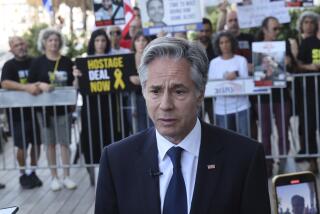Security Council OKs Peace Plan for Cambodia
UNITED NATIONS — The five permanent Security Council members agreed Tuesday on plans for a truce in Cambodia and U.N. administration of the country until a new government is elected.
It would be an unprecedented U.N. operation to solve a regional conflict, one U.S. diplomat said--costing $3 billion to $5 billion over one or two years and involving up to 10,000 peacekeeping troops and 10,000 civilian personnel.
The five council members--the United States, Britain, France, China and the Soviet Union--ended two days of private talks on details of a transitional administration to guide Cambodia to peace and democracy.
“We have gone as far as we can as the five permanent members,” a U.S. diplomat involved in the talks said. “Now it is up to the four Cambodian parties. The question is, can the four Cambodian factions agree?”
The diplomat was referring to the Khmer Rouge, its two non-communist guerrilla allies and the Vietnam-installed government in Cambodia. The diplomat and several other sources spoke on the condition of anonymity.
The Cambodian factions are to meet in Indonesia in September.
The U.S. diplomat said: “We think there are grounds, if not for wild optimism, at least for strong confidence” that all parties will agree.
A Western ambassador close to the talks said he thought the chances were better than even.
On Aug. 22, he said, the three resistance factions issued a communique expressing support for the work of the five permanent Security Council members and willingness to accept military and administrative arrangements, which were worked out earlier.
Tuesday’s accord means that the backers of the warring factions--the United States, Soviet Union and China--agree on a peace plan. The Khmer Rouge gets its weapons and supplies from China; the Soviets back the current Cambodian government of Prime Minister Hun Sen; the United States backs the two non-communist guerrilla factions.
More to Read
Sign up for Essential California
The most important California stories and recommendations in your inbox every morning.
You may occasionally receive promotional content from the Los Angeles Times.










